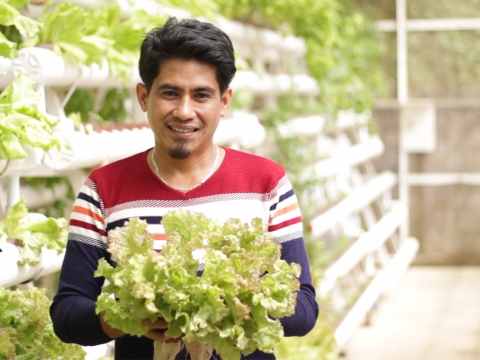Rafael Pagaling of Zennor Hydroponics Farm in Palauig, Zamables, continues to serve as resource speaker in various ATI-related training programs and advisory services. (photo by ATI-Central Luzon)
DILIMAN, Quezon City—A farmer from Zambales urged interested backyard gardeners to identify their purpose prior to setting up a hydroponic system in an interview during the “Agri Asenso” program of the Agricultural Training Institute (ATI) and DZRH.
Guest expert Rafael Pagaling, of Zennor Hydroponics Farm in Palauig, Zambales, shared that this is because the type of system varies “whether it be for personal consumption, small business, or commercial purposes."
He described that for family consumption, “one square meter planting lot is enough to grow 40-100 green leafy vegetables.”
“Even indoors, you can grow lettuce, kangkong, celery, among others, with the use of artificial grow lights,” Pagaling added.
The hydroponics expert shared some possible materials to be used for a do-it-yourself set-up.
“The Philippines has an abundant supply of coco peat or coco coir, which are good alternative for soil,” he said.
According to him, carbonized rice hull is also a soil alternative. Similarly, any available container or jar that can hold water may be used, including bamboo and wood.
Some vegetables that can be hydroponically grown in these alternative materials are cherry tomato, bitter gourd, eggplant, okra, and cucumber, among others.
Meanwhile, interested practitioners who intend to make hydroponics as a business or a professional venture may have to shell out a certain amount of capital. They may use metal frames for two or more heavy-duty greenhouses.
When asked about return of investment, the guest expert stated, “I am confident to say that there is really a good profit in hydroponics.”
“I was able to help my youngest brother finish his studies out of our earnings from selling our produce,” he narrated.
At present, their farm caters to clients from private banks, local government offices, small restaurants, and burger joints in the region. They also have customers in Metro Manila and Davao.
Pagaling is also able to serve his community through his hydroponic farm business. In March 2020, he donated some vegetables to the nurses and armed personnel in the province when the lockdown was enforced.
At the end of the interview, Pagaling encouraged urban farmers to consider hydroponics, believing that the “Philippines is globally competitive” in this agri venture.
This episode, hosted by ATI Information Services Division chief Antonieta Arceo and DZRH broadcaster Henry Uri, was aired last June 19.

